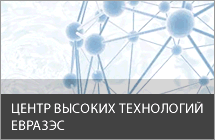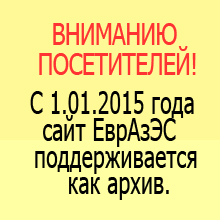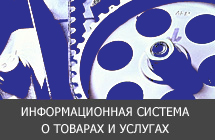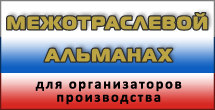|
REGULATIONS on the Interstate Council of the Eurasian Economic Community APPROVED by Resolution of the EurAsEC Interstate Council 31 May 2001, No. 3
REGULATIONS on the Interstate Council of the Eurasian Economic Community (as amended on 23 June 2006)
1. The Interstate Council of the Eurasian Economic Community (hereinafter referred to as the Interstate Council), pursuant to Articles 3 and 5 of the Treaty on the Establishment of the Eurasian Economic Community of October 10, 2000, is the supreme organ of the Eurasian Economic Community (hereinafter referred to as EurAsEC, or the Community). 2. Pursuant to Article 3 of the Treaty on the Establishment of EurAsEC, to an extent that does not contradict this Treaty, the Interstate Council assumes the functions of the Interstate Council of the Republic of Belarus, the Republic of Kazakhstan, the Kyrgyz Republic, the Russian Federation and the Republic of Tajikistan, established according to Article 17 of the Treaty on increased Integration in the Economic and Humanitarian Fields signed by the Republic of Belarus, the Republic of Kazakhstan, the Kyrgyz Republic and the Russian Federation on March 29, 1996, and the functions of the Council of Heads of the States of the Republic of Belarus, the Republic of Kazakhstan, the Kyrgyz Republic, the Russian Federation and the Republic of Tajikistan, constituted according to the Resolution No. 13 of the Interstate Council of the Republic of Belarus, the Republic of Kazakhstan, the Kyrgyz Republic, the Russian Federation and the Republic of Tajikistan of October 22, 1997. 3. The Heads of State and the Heads of Government of the EurAsEC member-states are members of the Interstate Council. 4. The Interstate Council meets at the level of Heads of State at least once a year and at the level of Heads of Government at least twice a year. Extraordinary meetings of the Interstate Council may be convened on the initiative of any the EurAsEC member-state or of the Chairman of Interstate Council to consider urgent the EurAsEC issues. The meetings of the Interstate Council may be attended by the Chairman of the Integration Committee, the Chairman of the Community Court of Justice, the Chairman of the Interparliamentary Assembly, the Parties’ Permanent Representatives to EurAsEC, the Secretary General and invited persons. 5. The Interstate Council executes the following functions: consider questions of principle of the Community’s activities that concern the common interests of EurAsEC member states; define the strategy, directions and prospects of developing integration and take decisions aimed at implementing EurAsEC objectives and purposes; take decisions concerning the following issues: – regulation of terms of mutual trade among the member states of the Community; – customs policy of the Community regarding the third states; – simplification and unification of customs regulations and procedures applied in the Community member states; – Harmonization of the national legislation of the EurAsEC member– states; listen to the reports of the Integration Committee concerning the state of affairs in the Community and the process of implementing its objectives and purposes; approve the budget of the Community for each budget year and listen to the report of the Integration Committee concerning its execution; approve the structure and numbers of the Secretariat of the Integration Committee as advised by the Integration Committee, and the distribution of quota positions concerning the Secretariat structure; establish the subsidiary organs of the Community and take decisions concerning the termination of their activity, define the number and work conditions of their employees; approve the symbols of EurAsEC; propose candidates to
appoint as judges in the appoint the Secretary General and relieve him/her of his/her position as advised by the Integration Committee; take decisions concerning opening representative offices of the EurAsEC Integration Committee; submit questions and recommendations to the Interparliamentary Assembly; questions to the Court of Justice of the Community, give directions to the Integration Committee and the Secretary General; define the list of treaties and other documents containing obligations the execution of which is necessary for the state entering EurAsEC and take a decision concerning its admission to the Community; take decisions concerning suspension or termination of participation of a member state in the work of EurAsEC organs on the grounds stipulated in Article 9 of the Treaty on the Establishment of EurAsEC, as well as concerning the admission to the Community; take decisions concerning granting, suspension or nullification of the status of observer with EurAsEC; take decisions on depriving a member state of the right to vote in the Community’s organs on the grounds stated in Article 15 of the Treaty on the Establishment of EurAsEC, as well as on restoration of this right; consider the draft fundamentals of legislation in the basic spheres of legal relationship, as well as recommendations of the Interparliamentary Assembly; take decisions on granting the rights of a legal entity to the Community members. 6. At its first meeting the Interstate Council elects the Chairman of the Interstate Council from the heads of the Community member-states and appoints the deputy Chairman of the Interstate Council and the Chairman of the Integration Committee that are, respectively, the head of the government and the deputy head of the government of the same state; the Interstate Council also appoints the Secretary General. Subsequently chairmanship in the Interstate Council is assumed on an alternate basis for one year in Russian alphabetical order by each Community member– state. In case the powers of a Head of State and/or Head of Government acting as the Chairman and deputy Chairman of the Interstate Council, respectively, expire before the end of the term of chairmanship, the functions of the Chairman and/or Deputy Chairman of the Interstate Council are passed to parties that will occupy the respective positions in the state that presides in the current year. 7. The Chairman of the Interstate Council and the Deputy Chairman of the Interstate Council: – conduct the Interstate Council meetings at the level of Heads of State and Heads of Government, respectively; – organize the work of the Interstate Council; – perform general supervision of preparation of the issues introduced for the consideration of the Interstate Council; – sign the organizational and protocol resolutions of the Interstate Council; – hold international negotiations and make treaties on behalf of the EurAsEC, represent the Community in relations with the third states and international institutions by order of the Interstate Council and within the limits of the powers granted to them; – control the execution of obligations deriving from the resolutions of the Interstate Council and from the treaties made in the framework of EurAsEC; – give orders to the Integration Committee, make inquiries in the Interparliamentary Assembly and the Community Court, perform general supervision of functioning and interaction among EurAsEC organs within the limits of their powers. 8. Resolutions, inquiries and recommendations of the Interstate Council are approved on the basis of a consensus; each member state has one vote. Decisions concerning suspension of membership or exclusion from the Community are taken according to the principle of “consensus minus one vote of the corresponding member state of the Community”. 9. States and international interstate (intergovernmental) organizations that were granted the status of observer with EurAsEC or their plenipotentiary representatives may participate in the Interstate Council meetings and receive information concerning the decisions taken there. 10. Organizational, informational, material and technical support of the Interstate Council’s activity is provided by the Secretariat of the Integration Committee. 11. Financial support of the Interstate Council’s activity including the conducting of meetings is made at the expense of the Community’s budget. 12. The working language of the Interstate Council is Russian. 13. The depositary of documents and resolutions of the Interstate Council is the Integration Committee. __________
|
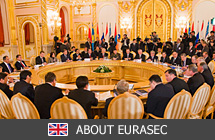
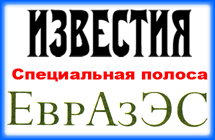
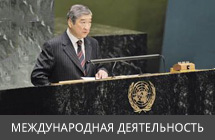
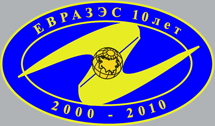
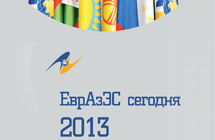
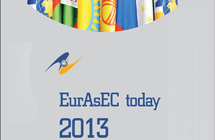
Поиск 10.10.2014 Заседание Межгосударственного совета ЕврАзЭС07.10.2014 Мультимедийная пресс-конференция в агентстве «Россия сегодня»03.10.2014 Встреча с Послом Финляндской Республики04.08.2014 Встреча Генерального секретаря ЕврАзЭС с Послом Республики Таджикистан20.06.2014 Премии Петербургского международного юридического форума «За вклад в развитие правовой интеграции на евразийском пространстве»28.05.2014 Договор о Евразийском экономическом союзе – важнейшее событие в новейшей истории наших стран25.05.2014 Презентация книги «Евразийский проект Нурсултана Назарбаева, воплощенный в жизнь. К 20-летию евразийского проекта 1994–2014»24.05.2014 VII АСТАНИНСКИЙ ЭКОНОМИЧЕСКИЙ ФОРУМ. Панельная сессия «Евразийской экономической интеграции – 20 лет. Итоги и перспективы»24.05.2014 VII Астанинский экономический форум и II Всемирная Антикризисная конференция, 21-23 мая 2014 года, Астана24.05.2014 Петербургский международный экономический форум, 23 – 24 мая 2014 года, Санкт-Петербург |

Евразийское экономическое сообщество
ЕврАзЭС
-
Страны участники
 Беларусь
Беларусь
-
 Казахстан
Казахстан
-
 Кыргызстан
Кыргызстан
-
 Россия
Россия
-
 Таджикистан
Таджикистан
-
 Узбекистан
Узбекистан
-
 Молдова
Молдова
-
 Украина
Украина

